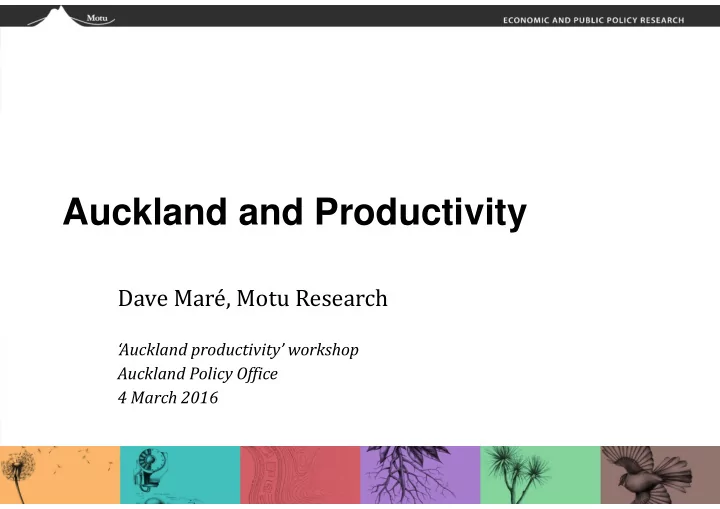

Auckland and Productivity Dave Maré, Motu Research ‘Auckland productivity’ workshop Auckland Policy Office 4 March 2016
Auckland is a package deal • Spatial Equilibrium – a helpful fiction People move unless places are • equally attractive Hamilton residents are willing to pay • Wages Auckland rents, if wages are high enough As drawn, Auckland is a great place to • live – people are willing to pay higher Auckland rents / get lower wages to be there Hamilton Firms move unless places are • equally attractive Hamilton firms would pay Akld rents • only if wages were lower than in Hamilton Firms are willing to locate in (higher- • cost) Auckland because they are more productive in Auckland Rental costs
Why is Auckland more productive? • Complementary productive inputs & advantages • The ‘extras’ in the package deal • Not included when we calculate productivity • Paid for in land rents, so profitability is equalised Auckland Bringing together diverse ideas/ seeing Learning what others do Easier to find the ‘right’ workers/ suppliers/ Matching customers Infrastructure/ gains from sharing variety/ Sharing specialisation/ risk Scale Only cities can Diversity potentially deliver on all 3 Specialisation
How much more productive is Auckland? • Labour productivity (LP) • Auckland Region (2006) had 33% higher LP than rest of NZ • Industry composition explains about half • Auckland has more industries that are high-productivity anywhere • Industries that are over-represented in Auckland are those that benfit most from being in Auckland • Multi-factor productivity • Higher levels of other inputs account for some more of the gap • Capital: Physical & intangibles • Density is implicated (“agglomeration elasticity”) • Doubling density associated with 4% - 6% higher productivity Maré. D C (2008) "Labour productivity in Auckland firms“ Motu Working Paper 08-12 Maré & Graham (2013) “Agglomeration elasticities and firm heterogeneity” Journal of Urban Economics 75, pp. 44-56.
Does more density raise productivity? • Yes, but the effects are weaker when density is already high Within industries and across regions (?) Maré & Graham (2013) “Agglomeration elasticities and firm heterogeneity” Journal of Urban Economics 75, pp. 44-56.
What else raises productivity? • Additional complementary shared local inputs • Which come at a cost • Skills • Complementary to growing industries • Positively linked with productivity, innovation, growth • Connectedness • Exposure to diversity of ideas, size of market, • Transport • Auckland not particularly strongly connected to Hamilton/ Tauranga • (Paling et al. 2011) • Migrants • NZ evidence of limited impact on productivity, innovation, exporting • (Maré et al 2011, 2013; McLeod et al 2014; Sin et al. 2014)
Loosening the leash or pushing on a piece of string • Relieving constraints likely to be more feasible/ effective than driving growth • (Unless constraints are very expensive to relieve) • Problem definition: Is there a missing complementary input • Addressing/ targeting symptoms likely to be ineffective • Lack of large firms – why? There may be substantive • • Limited diffusion – why? reasons why this is so It may cost more to ‘fix’ than • Low FDI/ ODI - why? • will be gained • Low competition – why? • Exporting as a goal - Reasons for not exporting • Export intentions more likely to be realised if motivated by local market limits (Sanderson, 2013)
Is the answer in Auckland? • A metaphor: NZ as a classroom • Auckland is the group of smart kids who sit at the front • Should the teacher focus attention on Auckland? • Rationales • Auckland is big • Auckland has the best performance • It’s easier to teach smart kids (lower costs?) • The teacher can make a bigger difference for the smart kids • higher benefits; peer effects through learning, competition • What’s good for Auckland is good for the class • Interactions: Network v FTF (face-to-face) v FOAF (friend of a friend) • Need to focus on the marginal impact • Make the biggest difference with teaching resource • (and stop the smart kids wanting to go to Sydney High)
Recommend
More recommend